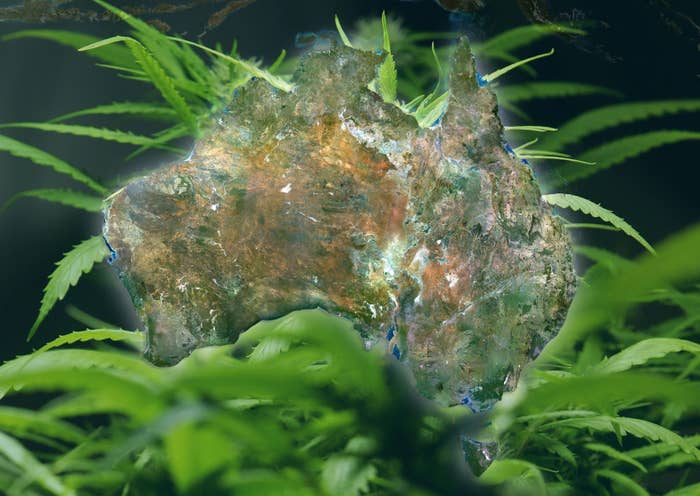
The president of the Royal Australian College of General Practitioners (RACGP) has called the country's medicinal cannabis regulations a "basket case" — but federal health minister Greg Hunt says it's a problem for the states and territories to sort out.
Last week, Bastian Seidel of the RACGP told ABC News it was almost impossible to get a prescription.
"It's impossible because of political reasons — that's why I've called it political cannabis rather than medicinal cannabis."
Politically, medicinal cannabis sits in the uncomfortable position of being overseen by both the federal government, states and territories, and the Therapeutic Goods Administration (TGA). Patients say it can be an incredibly tough process to navigate and differs depending on where you live in Australia.
When asked to respond to Seidel's comments, a spokesperson for Hunt told BuzzFeed News the minister agreed that the process needed to be simplified, and had written to states and territories asking them to do just that.
"At a federal level, we’ve legislated to allow for the first time pathways for doctors to prescribe medicinal cannabis, for domestic cultivation and manufacturing, and for importation," said the spokesperson.
"The states and territories play a role in assessing the suitability of the doctor to prescribe, and the patient to receive, all Schedule 8 (controlled) medicines (including medicinal cannabis products)."
Victoria says it's leading the way in the nation — as does NSW. Both states have invested millions of dollars into medicinal cannabis.
Victoria was the first state to legalise the drug in Australia and has since upped numbers on its compassionate access scheme.
NSW poured $6 million into a Medicinal Cannabis Advisory Service last year, with part of those funds going towards a medicinal cannabis hotline for GPs. The NSW government has committed a total of $21 million to cannabis research, but its hotline is not without critics, who say it only adds further layers to an already complicated process.
Elsewhere, the ACT is waiting for the federal government to make moves.
"The ACT government is happy to work with the Commonwealth to ensure people can access medicinal cannabis if they need," a spokesperson for ACT health minister Meegan Fitzharris told BuzzFeed News.
Currently, medicinal cannabis is available in the ACT as a Schedule 8 controlled drug. A prescriber can seek approval through the ACT chief health officer before then obtaining an authority to prescribe from the TGA.
In South Australia, medicinal cannabis isn't managed by the minister for health, but Kyam Maher, the minister for employment, manufacturing and innovations, Aboriginal affairs and reconciliation, and science and information economy.
A spokesperson for Maher did not immediately respond to a request for comment, but access in South Australia is currently through a patient access pathway. Patients in SA can be prescribed their medicine by a specialist who has been approved by the TGA, before it is then dispensed by a pharmacist.
Tasmania has only recently announced its cannabis access scheme, with two patients becoming the first in the state's history to receive the drug legally in November. However, there are reports of doctors and specialists in the island state being hesitant to prescribe.
In Queensland, there are numerous high-profile cases of patients struggling to navigate the system. Currently, Queenslanders can qualify for access by being eligible for clinical trials. Other than that, there's an access pathway via a specialist authorised to prescribe, or you can talk to a GP to apply for approval to prescribe.
The Queensland system has caused perhaps the most frustration. There are Facebook groups full of thousands of people attempting to access the drug legally who have been knocked back at multiple points along the access pathway.
Representatives for Northern Territory Department of Health said it had taken on a "simplified approach" to regulation of the drug "with no additional prescriber requirements imposed."
"There is clearly value for patients, prescribers and regulators in developing a harmonised and streamlined system for approvals and the NT Chief Health Officer has been selected as the Territory representative on the Patient Access Working Group," a spokesperson told BuzzFeed News.
The existing requirement for prescribing Schedule 8 products in the Northern Territory is that a prescriber is required to notify the state's chief health officer if the drug they are treating with is un-restricted.
"This requirement applies to all medicinal cannabis products in Schedule 8."
Pharmacies also provide NT Health with weekly updates on how many prescriptions they have dispensed.
And in Western Australia, doctors need approval to prescribe from both the TGA and WA Health. The approval all depends on the schedule listing of the cannabis product which can make it easier, or harder, to obtain. The state currently has its first cannabis crop being cultivated with an aim to have it available to patients this year.
Hunt has told states and territories to sort it out — and by all accounts, they believe they're doing just that. But the users of medicinal cannabis think otherwise.
BuzzFeed News has spoken to multiple people who have turned to the black market having felt exhausted by their state or territory's complex regulatory system. For these people, the alternative to illegal consumption cannabis as a medicine is pain.
"I never thought of leaving this country until now," a user of black market medicinal cannabis told BuzzFeed News on Wednesday.
"They tell you it's legal, but it's not. If it's legal I should be able to go to my doctor and they should be able to prescribe it for me. Not just slap a Fentanyl patch on me and tell me to leave."
